THE MISSION AT WAIILATPU
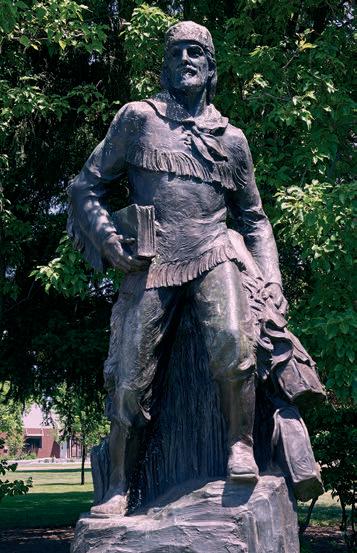
The Nez Perce men had traveled over 1,900 miles to ask Clark a question: Was it true that the white man had a book that explained the right way to worship the Great Spirit? Did the book tell what was pleasing to the Great Spirit? The book the Nez Perce were asking about was the Bible.
That story, most likely exaggerated, appeared on the front page of New York City’s Christian Advocate newspaper in 1833. Soon Protestant preachers and missionary societies were calling for volunteers to go out to Oregon Country to spread Christianity.
Not much was known about Oregon Country in the 1830s. Only a few explorers, trappers, and traders had reached the huge territory. But two volunteers came forward. One was a 27-year-old teacher named Narcissa Prentiss. The other was a 33-year-old doctor named Marcus Whitman. Both lived in western New York state. Narcissa was a single woman, so she was not seriously considered by the missionary board. No known white women had ever made the journey. Marcus’s application was accepted. Marcus knew the Prentiss family and heard of Narcissa’s interest in becoming a missionary. He called on the Prentiss family and proposed marriage to Narcissa. She accepted.
The American Board of Commissioners for Foreign Missions (ABCFM) wanted Marcus to make a preliminary trip before he and Narcissa moved to Oregon Country. In 1835, Marcus went with the Reverend Samuel Parker to test the idea of establishing missions among the Indigenous peoples. Marcus learned many skills on that trip. He learned how to load a pack animal. He learned how to ford swollen streams. He learned how to live off the land and to ride long hours through all kinds of weather.
This story is from the {{IssueName}} edition of {{MagazineName}}.
Start your 7-day Magzter GOLD free trial to access thousands of curated premium stories, and 9,500+ magazines and newspapers.
Already a subscriber ? Sign In
This story is from the {{IssueName}} edition of {{MagazineName}}.
Start your 7-day Magzter GOLD free trial to access thousands of curated premium stories, and 9,500+ magazines and newspapers.
Already a subscriber? Sign In
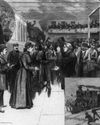
nellie Bly Journalist
nellie Bly's first newspaper articles appeared in print when she was just 20 years old.

Arabella Mansfield -Lawyer
Arabella Mansfield started out life as Belle Babb (1846-1911). She grew up in a Midwest family that valued education. In 1850, her father left to search for gold in California. He died in a tunnel accident a few years later.
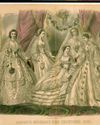
Sarah Josepha Hale Editor
Long before Vogue or Glamour caught women's attention, Godey's Lady's Book introduced the latest fashions.

Louise Blanchard Bethune - Architect
Louise Blanchard Bethune (1856-1915) showed early promise in math. Lucky for her, her father was the principal and a mathematics teacher in a school in Waterloo, New York. Instead of going to school, Louise's father taught her at home until she was 11 years old. She also discovered a skill for planning houses. It developed into a lifelong interest in architecture and a place in history as the first professional female architect in the United States.
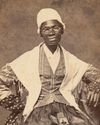
Sojourner Truth Speaker
There was a time when slavery wastes abolished the institution over a number of decades. New York abolished slavery in 1827. Isabella Baumfree (c. 1797-1883) was born enslaved in Hurley, New York. When she was nine, she was taken from her parents and sold. She then was sold several more times. Some of her owners were cruel and abused her. During that time, she had several children.
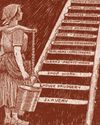
Getting Started
In this editorial cartoon, a young 19th-century woman must overcome the obstacle of carrying a heavy burden while climbing a multirung ladder before she can achieve \"Equal Suffrage.\"
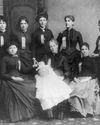
Leonora M. Barry - Investigator
When Leonora M. Barry (1849-1923) was a young girl, her family left Ireland to escape a famine. They settled in New York. Barry became a teacher. In 1872, she married a fellow Irish immigrant. At that time, married women were not allowed to work. So, Barry stayed home to raise their three children.

Finding a New Path
For many Americans, this month's mystery hero represents the ultimate modern trailblazer. She is recognized by just her first name.
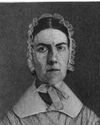
The Grimké Sisters Abolitionists
Every night, Dinah was supposed to brush the E hair of her mistress, Sarah Moore Grimké (1792-1873). But one night, 12-year-old Sarah stopped Dinah. She wanted to help Dinah instead. They had to be quiet so they wouldn't get caught. It was 1804 in Charleston, South Carolina. The Grimkés were among Charleston's major slaveholding families. Strict laws regulated the behavior of both master and enslaved people.
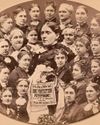
Frances Willard Leader
During Frances Willard's lifetime (1839-1898), she was the best-known woman in America: She headed the largest women's organization in the worldthe Woman's Christian Temperance Union (WCTU). In that role, her abilities shone as a social activist, a dynamic speaker, and a brilliant organizer. She educated women on how to run meetings, write petitions, give speeches, and lobby state and federal legislators.
